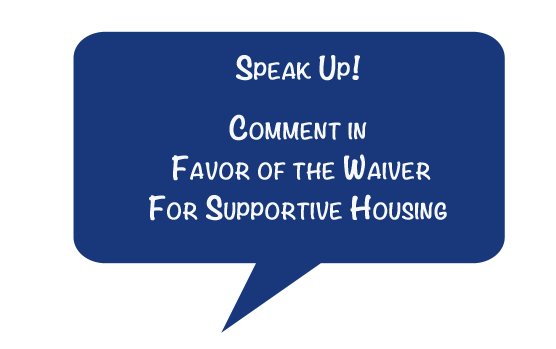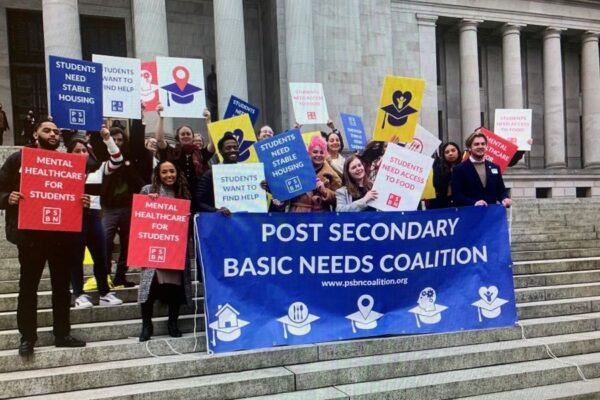Favor the Waiver for Supportive Housing & help end homeless in our community
 Colleen Laing, Associate Director, Planning and Public Policy at United Way, is keen on reaching our goal to reduce the number of people on the street in our community by 50%. It may sound lofty, but we have great minds and unstoppable passion to get this done.
Colleen Laing, Associate Director, Planning and Public Policy at United Way, is keen on reaching our goal to reduce the number of people on the street in our community by 50%. It may sound lofty, but we have great minds and unstoppable passion to get this done.
But we can’t do it alone. We’re going to need your help. Read on to find out about how your Favor for the Waiver for Supportive Housing will help end homelessness.
What is Supportive Housing?
There are many reasons people have barriers to staying housed, to name a few:
- Severe mental illness
- Physical disabilities
- Substance abuse issues
- A combination of the above
Often these people become chronically homeless. This means to be homeless for a long time, or to experience homelessness multiple times.
Permanent Supportive Housing (PSH) is an approach that provides housing services to keep people with barriers stably housed.
Let’s breakdown Permanent Supportive Housing:
Permanent
No time limit on this housing (this can be a struggle if you are battling something like alcoholism. Can you imagine bouncing around from shelter to semi-permanent housing where all your stuff gets stolen, again, and then you get kicked out because you had a drink? How is that helpful?)
Supportive
Someone is going to come around and help with problems that people facing homelessness can have. Behavioral health services like:
- Mental health treatment
- Substance abuse treatment
- Health care services—You know, like doctors. Image how your feet become after being homeless for years.
Why choose PSH?
- It’s cost-effective
- Has low-restrictions so people function at their best and aren’t pushed back out on the street before they get the help they need to stay off the street
- Helps people avoid expensive crisis services like ambulances, emergency rooms, jails and prosecutors.
Where does Medicaid come-in?
Most residents in PSH are eligible for Medicaid. There is a proposal out (foreshadowing moment my friends, your favor the waiver moment is coming!) for supportive housing to have the State Healthcare Authority request a waiver from Medicaid to allow our state to use Medicaid dollars to fund parts of PSH.Why are we so passionate about this?
We’ve always been passionate about ending homelessness. In 2005 we spearheaded the Campaign to End Chronic Homelessness and raised $20 million for that cause and funded 1,000 new units of housing for chronically homeless individuals. PSH is a central strategy to ending chronic homelessness.
We are now looking to sustain and build upon our previous successes. Our funds are used to pay for services in PSH, but we can’t do it alone.
That’s where Medicaid and you! come in. A Medicaid benefit for supportive housing would sustain a significant portion of our current investments, allowing United Way to provide a sustainable amount of funding for other PSH services when our $20 million is exhausted.
The Good News
Washington’s Health Care Authority has drafted a waiver request, and opened a public comment period on the draft. Let your voice be heard. You can help sustain United Way’s work by commenting in favor of the waiver request here.I strongly support the inclusion of a supportive housing benefit in Washington’s 1115 Medicaid Waiver request. Evidence has demonstrated that supportive housing is effective in helping people who are chronically homeless access and retain permanent housing and regular, appropriate levels of health services. This intervention leads to housing stability, positive health outcomes, and improved utilization of health and social services. These proven outcomes result in significant savings to public systems that often exceed the cost of providing supportive housing, and over half of the savings are realized by Medicaid (Journal of the American Medical Association, ).
United Way of King County, is investing $20 million of privately raised philanthropic dollars in ending chronic homelessness, much of it in low barrier, permanent supportive housing. Using Medicaid dollars to stabilize a population with acute health issues and thereby reduce Medicaid spending is good public policy.
Thank you





Comments